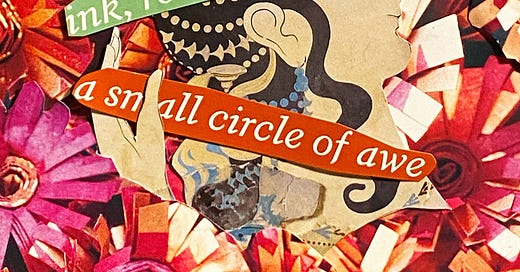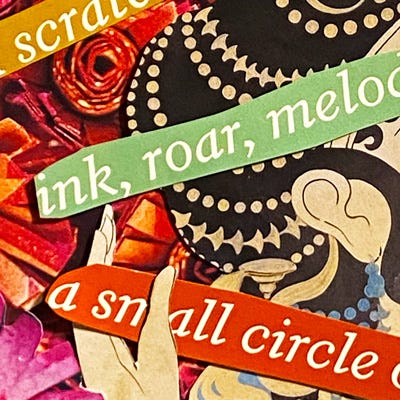Dear fellow writer,
I’ve borrowed today’s title and tagline from two of my favorite books:
Your Brain on Art: How the Arts Transform Us by Susan Magsamen and Ivy Ross (Random House, 2023)
What Poetry Brings to Business by Clare Morgan (Univ of Michigan Press, 2010)
The poetry snippets in my paper collage come from an Academy of American Poets calendar that I cut up several years ago; a quick Google search reveals the poets to be, from top to bottom, Brenda Shaughnessy, Erica Hunt, and Marcelo Hernandez Castillo.
In a fascinating overview of recent neurocognitive research on how poetry affects the brain, Magsamen and Ross observe:
A poem that truly resonates with us does so at a neurological level by stimulating the areas of the brain that are associated with meaning-making and the interpretation of reality. Poetry, at a cognitive level, can help us make sense of the world and consider our place in it. (Your Brain on Art, p. 79)
This week in the “Play with Poetry” module of my Creativity Catalyst, I’ve been encouraging writers from a wide range of disciplines and genres to incorporate poetry into their daily lives, their writing lives, and their personal and professional writing. The excitement amongst the participants has been palpable. When we contemplate our academic research (or anything else!) through the opaque-yet-clarifying lens of poetry, we discover things that we didn’t know we know.
One seasoned scholar — a public health researcher — experienced an intellectual ephiphany when she composed her very first research poem:
This week's exercise caused my office desk sparkling fireworks, that's how it felt. While I was thinking and writing a poem! about public health expenditure! I could feel the sparks coming out, like from the friction of two radically different and strong metals. [The] two different sides are the technical/academic and sentimental/poetic sides of me. And I’ve never cared to join them, thinking they were so different.
Another reflected on the cognitive value of compressing complex ideas into poetic language:
I think poetry is a form of writing with great benefit to academic writers. Condensing our ideas is difficult, especially the more complex they are. But the more complex, the more we need to be able to condense them. [Poetry] can help us with understanding our main point, generating important words, and redrafting our thoughts into a clear point that the reader will appreciate.
As promised, I’ve been playing along with this week’s poetry experiments. Below are two of my own research poems, along with the prompts that generated them. Try them out for yourself if you want to see fireworks sparking from your writing desk — and your writing brain!
Looking for more inspiration? Check out last year’s poetry experiments in the 2022 Creativity Catalyst Showcase.
Enjoy!
1. To My Darling Research
This week in my Live Writing Studio, I asked the participants — an eclectic group of writers from across the disciplines and around the world — to introduce themselves by holding up to the camera an interesting object found on or near their desk. Here’s the list that we collectively generated (you can probably guess which item was mine!):
Freddie the fluffy dog, koru (fern frond) earrings, shiny phone, tiny elephant, sprig of rosemary, red coin purse, a pack of cards, driftwood collage, hand cream
Next, I asked them to describe their current writing project in the Zoom chat and to explain why it interests or excites them. Finally, as a creative warmup before we turned to our “serious” writing, I prompted them to draft a short poem about a person, object, or topic central to their writing.
The Prompt
(Note: If you’re not an academic researcher, feel free to replace the word “research” with “writing.”)
(2 minutes) Jot down a list of objects that you see around you in your writing space — or, better yet, ask someone else to generate a random list of concrete nouns for you.
(3 minutes) Describe your current research topic. What are you writing about, and why? What interests or excites you about your topic?
(5 minutes) Write a poem addressed to a person, object, or topic central to your research, starting with the words, “To My Darling ___________.” For an extra challenge, incorporate some or all of the objects on your list into your poem!
The Poem
I’m not currently working on a research project myself, so I decided to write instead about my online writing community, the WriteSPACE.
TO MY DARLING WRITESPACE
You’re my daily companion,
the fluffy white dog snoozing by my desk.
You unfold like a koru,
a spiral of awakening.
You sharpen my senses
like a sprig of rosemary.
I play you like a pack of cards,
carry you around like a coin purse.
You whisper in my ear like a shiny phone
and soothe my cracked spirit
with the healing handcream
of community.Wild and serendipitous as driftwood,
you’re bearing me away to someplace new —
but where?In your presence,
I feel as shy and brave and certain
as a tiny elephant.
2. Research Haiku
My friend and colleague Margy Thomas, founder of ScholarShape, encourages academic writers to identify the “Story-Argument” that underpins their research. A few years ago, while I was working on my book Writing with Pleasure, I wrote a 5-7-5 syllable haiku summing up the Story-Argument of each of my chapters, plus the preface, introduction, section headings, and conclusion. So here it is: my entire book condensed down to a sequence of 15 haiku!
The Prompt
Choose a meaty piece of prose such as a book, a chapter, or an article, then express its main idea as a haiku: 5 syllables / 7 syllables / 5 syllables. For a further challenge, commit to using only concrete language — no abstractions. Taking a fractal approach, you can repeat this exercise for every chapter of a book, every section of an article, or even every paragraph or sentence of a complex argument.
The Poem
WRITING WITH PLEASURE
Preface: Why Pleasure?
Writing with pleasure
is better, wouldn’t you say,
than writing with pain?Introduction: The SPACE of Pleasure
I’ve laid out this book
as a pleasure smorgasbord
for you to feast onPART I: Pleasure Principles
Social, Physical,
Aesthetic, Creative,
Emotional: SPACE!Chapter 1: Society and Solitude
The social pleasures:
society, solitude,
and intimacyChapter 2: Body Basics
Physical pleasure:
writing bodies revel in
senses, motion, placeChapter 3: On Beauty
Aesthetic pleasure:
beauty in writing about
beautiful writingChapter 4: The C-Curve
Creative pleasure:
cognition, challenge, and choice
are the waves we rideChapter 5: States of Mind
Writing emotions:
passion, playfulness, and praise
hatch happy penguinsPART II: Pleasure Practices
Find joy in writing
through tools, processes, cultures,
and a balanced lifeChapter 6: On the Ground
The hand on the page,
the page in the book, the book
in the hand: delight!Chapter 7: In the Sky
Skytools, skywriting,
skyspace – but still we long for
flying unicorns . . .Chapter 8: Wind, River, Stone
How can we channel
whirlwind and wordflow into
lines written in stone?Chapter 9: Star Navigation
Follow your own star;
share your food; strive to be both
teacher and learnerChapter 10: On the Island
Rest in the hammock,
surf in the waves, but write in
the littoral zoneConclusion: The SPACE of Writing
Grounding, broadening,
deepening: let’s make SPACE for
writing with pleasure!
There’s so much more that I could say here about research poetry! These two poems were never intended for an audience; my purpose in writing them was to open my mind to a deeper understanding of my topic. But poetic inquiry is a well-established research methodology in its own right, supported by a robust body of scholarly publications that employ poetry as a mode of data collection, argumentation, presentation, persuasion, and more.
If you’d like to see more posts about research poetry in this newsletter, please let me know in the comments down below. At the very least, I hope that you’ll feel inspired to try out a poem or two of your own. And if you enjoyed reading this post, please share it with your friends, or at least haiku me a heart.
Kia pai tō koutou rā (have a great day) – and keep on writing!
Helen










Love, love, love this, Helen. ❤️😍